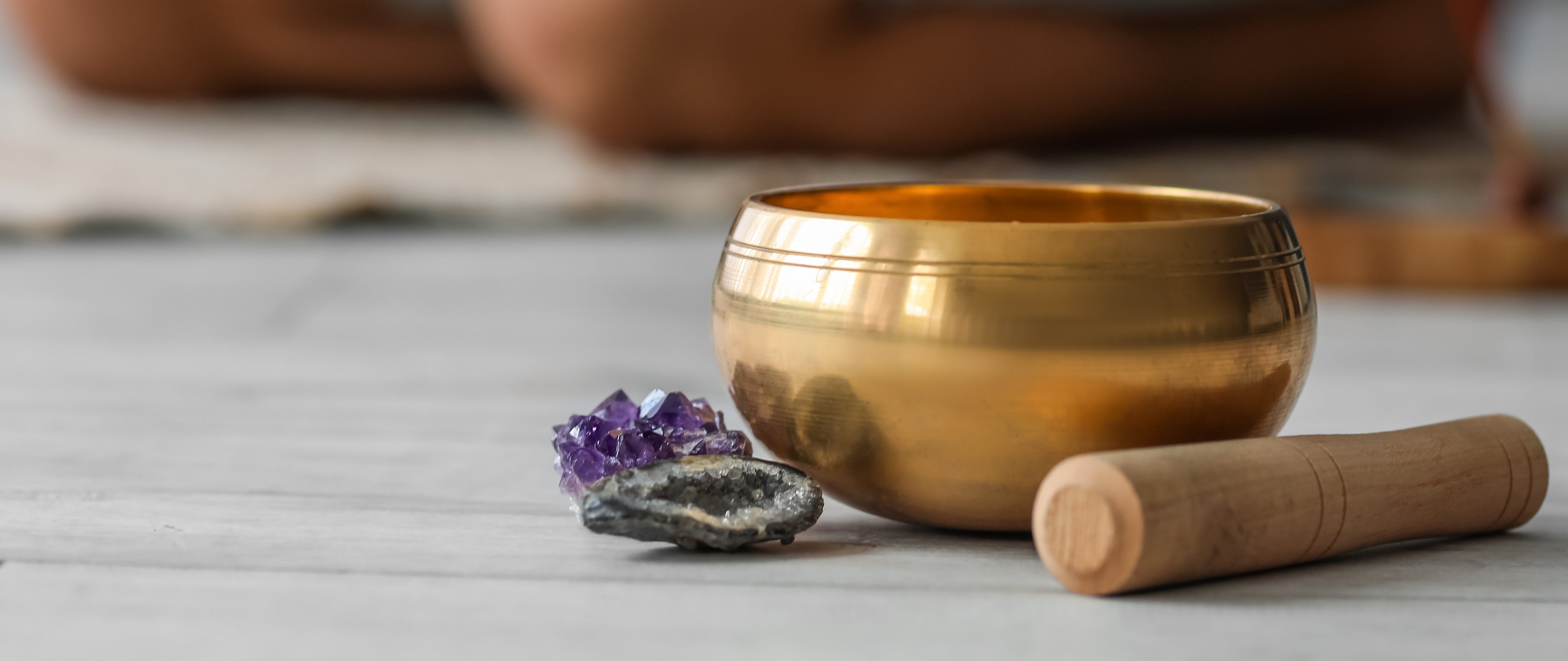From ancient monasteries to modern-day spa retreats, singing bowls have consistently struck a chord (quite literally) with humanity. Their fascinating journey, spanning continents and cultures, attests to their universal appeal and transformative capabilities. Let’s delve deeper into the world of these sonic wonders.
History of Singing Bowls
The ethereal tones of singing bowls have captured the human imagination for centuries. Originating from the Himalayan regions of Tibet, Nepal, and India, these intriguing instruments have a history that intertwines with ancient rituals, meditation, and healing practices.
Traditionally crafted from an amalgam of metals, some claim these bowls are made up of seven metals, each representing a celestial body.
The mastery in crafting these bowls is passed down through generations, keeping the ancient techniques alive. Their unique sound comes from both the combination of metals and the manner in which they are played, either by striking or running a mallet around their rim.
As Buddhism spread across Asia, so did the singing bowls, becoming integral to meditation and chanting. Today, they have found a global audience not just among spiritual practitioners but also with musicians, therapists, and individuals seeking relaxation and healing through sound. This enduring appeal, rooted deep in history, only reinforces the timelessness of the sounds they produce.

The Many Uses of Singing Bowls
Singing bowls have been used for centuries in various cultures and for a myriad of purposes. These enchanting instruments offer more than just pleasant sounds; they have a broad range of applications, both spiritual and therapeutic:
- Meditation and Relaxation: The harmonious tones of singing bowls can guide one into deeper states of meditation. Their resonating frequencies can help quiet the mind, making it easier for individuals to focus and find their inner peace.
- Chakra Balancing: In many spiritual traditions, it's believed that our body consists of energy centers or chakras. Singing bowls are often used in sound therapy to balance and align these chakras, promoting overall well-being and vitality.
- Stress Reduction: The soothing sounds emanating from these bowls can reduce feelings of stress, anxiety, and tension. This relaxation response can lower heart rate, blood pressure, and slow down the breath, inducing a state of calm.
- Sound Healing: Some practitioners believe that the vibrations produced by singing bowls can promote healing at the cellular level. These vibrational frequencies can aid in pain management, boost immune function, and improve overall health.
- Aid in Yoga and Deep Breathing: Singing bowls are often incorporated into yoga sessions and deep breathing exercises. Their calming tones can enhance one's practice, making it easier to move into and maintain challenging poses and deep states of relaxation.
- Ritual and Ceremony: In many cultures, singing bowls are integral to religious and spiritual ceremonies, providing a backdrop of sound that facilitates prayer, chanting, or the honoring of deities.
- Enhance Learning and Memory: The repetitive rhythms and tones of singing bowls can aid in improving focus and concentration, making them useful tools in educational settings and for memory enhancement.
Let's do a deep dive into each of these uses, and discover how you can apply them to your daily life.
Use in Meditation and Relaxation
The sound frequencies emitted from a singing bowl have the profound ability to penetrate deep into our consciousness, creating a bridge to tranquility and heightened awareness.
During meditation, the vibrations emanating from the bowl can help in harmonizing the body's chakras or energy centers, facilitating a more balanced flow of energy throughout the body. For relaxation, the melodious tones work as an acoustic therapy, soothing the nervous system and reducing feelings of stress or anxiety.
Many believe that these bowls also possess healing properties, and when played, they promote a deep state of calm and well-being, thereby paving the way for inner peace and rejuvenation.
Use in Balancing Chakras
When our chakras are misaligned or blocked, it can lead to physical, emotional, and spiritual imbalances. By playing singing bowls in proximity to the body, their harmonious vibrations can stimulate the chakras, promoting energy flow and realignment.
Each bowl is said to correspond with a specific chakra based on its size and the pitch of its sound. For instance, deeper tones might resonate with the root chakra at the base of the spine, while higher-pitched bowls might align more with the throat or crown chakras.
Incorporating singing bowls into meditation or healing practices can provide a holistic approach to chakra balancing, further enhancing the sense of relaxation and focus.
Singing Bowls can relieve Stress & Anxiety
The science behind its stress-relieving properties is fascinating. The soothing tones emanating from these bowls can alter our brain waves, transitioning us from the more active Beta state to the relaxed Alpha or even meditative Theta states.
This shift promotes deep relaxation and mental clarity, allowing for stress to melt away. Moreover, the vibrations from the bowls can resonate within our body at cellular levels, further facilitating healing and balance.
Today's embrace of singing bowls in meditation sessions, yoga classes, and therapeutic practices stands as a testament to their efficacy in combating stress and fostering a sense of tranquility.
Therapeutic Symphony in Sound Healing
At its core, sound healing is an ancient therapeutic practice that utilizes various aspects of music to foster emotional and physical healing and well-being. Singing bowls are favored instruments in this modality due to their capacity to produce multi-tonal overtones that can deeply resonate with the human body.
As the bowl is struck or rimmed, it creates vibrations that quickly spread outward, much like ripples in water. These vibrations are not just heard; they are palpably felt.
Many practitioners and recipients believe that these waves of sound frequency can align with the body's internal frequencies, helping to restore balance, facilitate energy flow, and even stimulate the body’s natural healing processes.
The mesmerizing, rich tones they emit can lead listeners into states of deep relaxation and meditation, further bolstering the belief that singing bowls are more than mere instruments — they're tools of profound sonic therapy.
Aid in Yoga and Deep Breathing
During yoga sessions, the sound of the bowl can enhance one's sense of presence and focus, thereby deepening the connection to the practice.
Similarly, when incorporated into deep breathing exercises, the melodious hum of the bowl can act as an auditory anchor, guiding the rhythm of breath and facilitating a tranquil state of mind.
Singing Bowl Rituals and Ceremonies
Historically, monks and spiritual leaders incorporated them into meditation practices and religious ceremonies as a means to usher in stillness and center the mind.
Today, beyond the monastic confines, the use of singing bowls has transcended into various global ceremonies, wellness retreats, and even therapeutic sessions.
Their ability to create a sacred space, bridge connections between the spiritual and the tangible, and engender a sense of peace and clarity, remains unparalleled, making them an indispensable tool in many rituals worldwide.
Enhance Learning and Memory
When introduced during learning sessions, the sounds of singing bowls have been linked to enhanced focus and increased retention rates. The vibrational frequencies create a calming ambiance that can mitigate distractions, paving the way for an optimal learning environment.
Moreover, these sounds stimulate the theta brainwave state – a frequency associated with deep relaxation and heightened creativity. In this state, the brain can absorb new information more efficiently and store it in long-term memory.
Thus, the integration of singing bowls in educational settings or personal study sessions could be an innovative approach to bolster learning and memory, merging ancient wisdom with contemporary neuroscience.

Why are some Singing Bowls high-pitched?
Firstly, the composition of the bowl plays a pivotal role; traditionally, singing bowls were made of a seven-metal alloy, with each metal producing its unique sonic signature. The thickness and shape of the bowl, as well as its size, dictate the fundamental frequency and overtones it can produce, with larger bowls generally resonating deeper tones and smaller ones producing higher pitches.
The manner in which the bowl is played—whether struck or rubbed—will also affect its tonal quality.
Furthermore, the striker's material and hardness can accentuate different frequencies. Even subtle variables, like the bowl's temperature or the humidity of the environment, can subtly modify its sound. Thus, the tone of a singing bowl is not just a product of its physical characteristics but a complex interplay of its material, design, external conditions, and the method of play.

Which Singing Bowl is right for me?
The answer lies in understanding your personal needs and preferences. Start by deciding on the primary purpose of the bowl - are you looking for a tool to aid in meditation, a therapeutic instrument, or simply a beautiful addition to your home's ambiance?
Next, consider the tone and pitch. Just like any musical instrument, different bowls produce varied frequencies, and you might resonate more with one over another. The material of the bowl, usually brass, bronze, or crystal, can also influence its sound and energy.
It's highly beneficial to listen to various bowls before making a choice. This is why it's encouraged to visit a store in person and test them out firsthand.
Finally, the size and aesthetic appeal of the bowl, while secondary, can play a part in your decision, especially if you're looking to place it as a decorative element. Remember, the right bowl for you is the one that not only sounds pleasing but also feels harmoniously aligned with your energy and intent.

How to Use Singing Bowls
To use a singing bowl, start by placing it on a flat surface or hold it gently in the palm of your non-dominant hand, keeping your fingers extended. With the mallet in your dominant hand, lightly strike the bowl's side to produce a ringing tone.
After the initial strike, encircle the rim of the bowl with the mallet, maintaining consistent pressure. As you do this, the bowl will start to "sing", emitting a continuous and harmonious sound.
The speed and pressure of the mallet's movement will influence the tone and volume of the sound. As you become more practiced, you'll be able to modulate the sound to your liking.
Conclusion
In an age dominated by digital distractions and rapid-paced lifestyles, the allure of singing bowls is not just in their melodic symphonies, but in the space they create – a sacred pause inviting introspection and peace. For many, it's a connection to ancient practices; for others, it's a therapeutic escape. Communities across the globe gather, transcending barriers of language and culture, united by the universal language of sound these bowls produce.
As we navigate the challenges of the modern world, the ancient wisdom encapsulated in singing bowls provides not just a respite but a pathway to deeper understanding and harmony. These instruments, with their ethereal tones and vibrations, are a gentle reminder of the innate human need for balance, peace, and connection to something greater than ourselves.
In embracing singing bowls, we don't just honor the ancient traditions they originate from, but we also fortify our contemporary journey towards holistic well-being, fostering a world where mind, body, spirit, and sound exist in perfect symphony.





